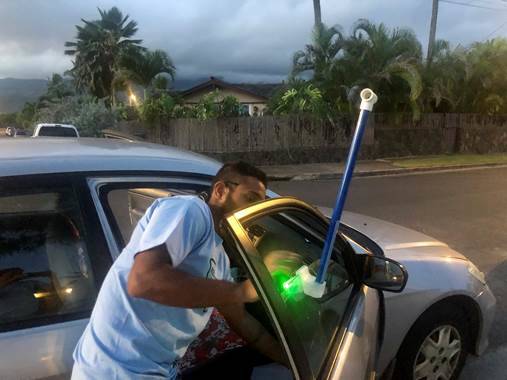Volunteers map out hottest Oahu neighborhoods for NOAA campaign

COURTESY CITY AND COUNTY OF HONOLULU
A heat mapping volunteer affixes equipment to his vehicle.
With the help of volunteers, Honolulu’s Office of Climate Change, Sustainability, and Resiliency said it has successfully completed Oahu’s first Community Heat Mapping Opens in a new tabCampaign Opens in a new tab.
Honolulu was one of 10 cities selected nationally to partner with the National Oceanic and Atmospheric Administration’s Climate Program Office Opens in a new tabto conduct a “community heat assessment,” identifying the hottest spots of local neighborhoods on Oahu at no cost to the city.
The NOAA-funded project maps out places where buildings, asphalt and other parts of urban environments can amplify high temperatures, and put people at heightened risk of heat illness during extreme heat events.
“By completing a Community Heat Assessment, Honolulu is laying the foundation to address extreme heat events across the island,” said Mayor Kirk Caldwell in a news release. “A robust heat analysis can help guide new tree planting initiatives, reflective surface deployment programs, or the implementation of cooling centers. This is data that will spur positive action among our residents and government leaders.”
Other partners in the Honolulu campaign include CAPA Strategies, the Science Museum of Virginia and National Integrated Heat Health Information System.
On Aug. 31, a total of 28 volunteers equipped with sensors that automatically record temperature, humidity and GPS locations attached to their vehicles, drove along predetermined neighborhood routes to better understand heat baselines across Oahu’s neighborhoods.
Don't miss out on what's happening!
Stay in touch with breaking news, as it happens, conveniently in your email inbox. It's FREE!
The volunteers repeated the one-hour routes at 6 a.m., 3 p.m., and 7 p.m. to understand where it heats up the most, and where it cools down the least during the evening.
The automatic sensors were provided at no cost to the city by CAPA Strategies, then returned for final analysis.
“Mapping heat on our island is not just about tracking the mercury each year in terms of temperature as our climate heats up,” said Josh Stanbro, Honolulu’s Chief Resilience Officer, in the release. “It’s really about finding out where our neighborhoods are most vulnerable to heat waves, and then figuring out how to prepare and protect residents before the mercury breaks through the top of the thermometer.”
On Aug. 31, the day that volunteers mapped the heat, two record high temperatures and one record high match were noted in the Hawaiian isles.
The National Weather Service reported that a record high of 95 in Honolulu surpassed the previous record of 93 set in 1984. A record high of 91 in Lihue broke the old record of 88 set in 2016. A high of 89 in Hilo matched the previous record set in 2015.
City officials say capturing data on a record day of heat will be critical to projecting what future extreme heat days will have in store for Oahu.
According to NOAA, July was the hottest month Opens in a new tab on record for the planet in its 140-year record. NOAA also noted Hawaii temperatures in July and August this year were the second highest departure from the average on record, behind 2015.
The risk of potentially deadly heat waves impacting Honolulu is also rising, according to the Resilience Office, which cited 2015 and 2016 as the warmest years in Hawaii’s modern history. So far this summer, Honolulu has broken dozens of daily temperature records, with the most recent on Sept. 9, when a record high of 92 surpassed the previous one of 91 set in 2018.
Other cities participating in the mapping campaign include Boston, Mass., Miami, Fla. and Seattle, Wash. Results of the Oahu mapping campaign are expected within the next two months.
Contact Ujay Siddharth at u.siddharth@honolulu.gov to learn more about the Oahu Community Heat Mapping Campaign. Learn more about the Honolulu Office of Climate Change, Sustainability and Resiliency at resilientoahu.org Opens in a new tab.




